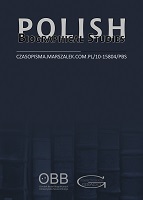Od idealisty do katolickiego Talleyranda
From an idealist to a Catholic Talleyrand
Andrzej Micewski - ideologist, activist and political player in Catholic circles in post-war Poland
Author(s): Ariel OrzełekSubject(s): Christian Theology and Religion, Cultural history, Political history, WW II and following years (1940 - 1949), Post-War period (1950 - 1989)
Published by: Wydawnictwo Naukowe GRADO
Keywords: Andrzej Micewski; PAX Association; political thought;
Summary/Abstract: The article focuses on the political and ideological evolution of Andrzej Micewski, with a particular study of the years 1945–1956. This journalist, initially associated with Tygodnik warszawski and Stronnictwo Pracy, made a connection with the group „Today and Tomorrow” after the fall of the independent Christian Democratic trend. Initially, he was a spokesman for the Catholic „third Road” there, but with time he became one of the most ardent supporters of „Catholic socialism” and ideologist of the „PAX” Association. His journalism fully supported the mainstream of official propaganda, expressing his enchantment with the system, incl. in assessing the internal and international situation, as well as in the context of the relationship between the state and the Church, in which he clearly stood on the side of the authorities repressing independent clergy. In 1956, however, he left PAX, founding the weekly magazine “For and Against” and co-creating the concept of a “non-partisan democratic left”. Its defeat probably caused him to believe that there were no prospects for ideological public activity. With time, his activities became more and more machiavellian, also he establishing cooperation with state security agencies. He was active in the “Znak” movement, trying unsuccessfully to build his own faction in it, and in the 1980s he collaborated with the Polish Episcopate and “Solidarity”. In the Third Polish Republic there was deputy to the Sejm, however, already expressing disappointment with political activity. His fascination with Prince Talleyrand was symbolic - it meant that he covered his opportunistic game with great ideas. Thus, he turned from an idealist, a believer in socialism, into a cynical official. He treated politics only as a zero-sum game, despite his excellent understanding of the arcana of politics, which he proved in his extensive historical journalism.
Journal: Polish Biographical Studies
- Issue Year: 9/2021
- Issue No: 1
- Page Range: 145-196
- Page Count: 52
- Language: Polish

